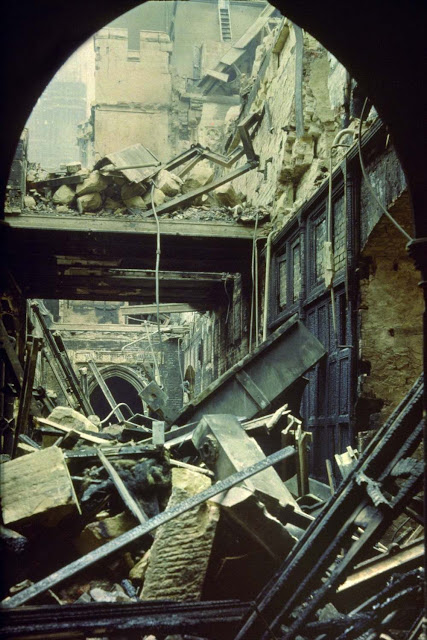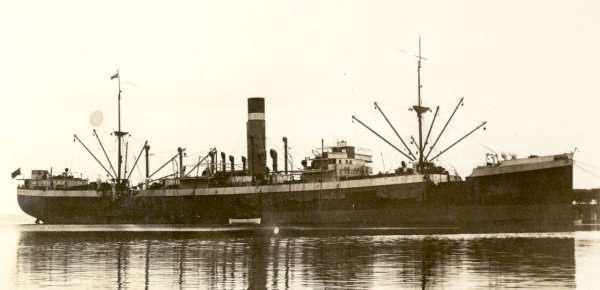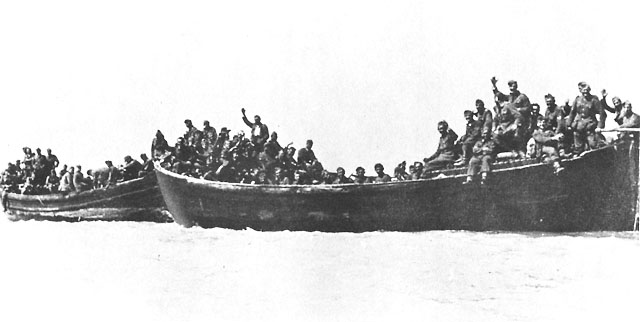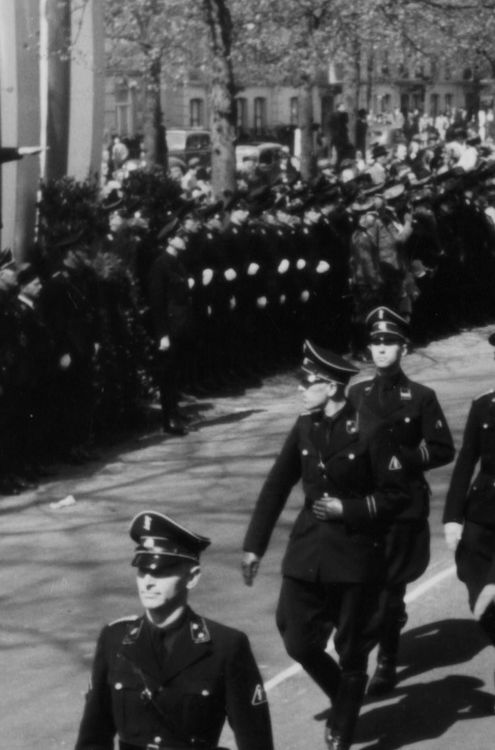Sunday 11 May 1941
 |
| Ludgate Circus, London, 11 May 1941. |
 |
| Hitler Youth celebrating the Hour of Commemoration in front of the Town Hall in Tomaszow, occupied Poland, 11 May 1941 (US National Archives ARC 540131). |
Fritz Grobba, the German representative to Baghdad, arrives there via Syria. The Luftwaffe liaison officer to Rashid Ali, Major Axel von Blomberg, though, is killed by mistake while trying to land at Baghdad when Arab tribesmen open fire on his transport.
European Air Operations: The Luftwaffe continues its latest reversion to previous failed bombing strategies, sending large aerial forces against RAF airfields during the night. The damage caused is insignificant because many of the airfields are dummies marked out precisely for this purpose. If there is one common characteristic of Luftwaffe bombing strategies to this point, it is their abandonment right when it appears they are making a real impact in favor of another, completely different strategy.
London remains barely functional following the massive air raid of 10 May. The House of Commons chamber is badly damaged, so the Members of Parliament now meet in the House of Lords. Streets are clogged with debris, some 150,000 London residents are without basic utilities, the main railway sheds such as Victoria Station are all damaged, and 5,000 homes are destroyed. Fires remain unextinguished, and incendiary bombs lie in many streets and parks. The mayors of Westminster and Bermondsey are dead, the city has the pungent aroma of the burning Palmolive soap factory west of downtown. The Paul Delaroche painting "Charles I Insulted by Cromwell's Soldiers" is presumed lost in the fires, but in fact is rolled up in a secure location and in perfect condition (this happenstance is not realized, though, until 2009).
Berlin radio reads the following communique from the OKW:
Over the last few nights the British air force has once again deliberately bombed the residential districts of German cities, including the German capital. In retaliation, strong German Luftwaffe forces carried out a major assault on London last night. Ground visibility was good and the British capital was bombed throughout the night by relay waves that dropped high-explosive bombs of all calibres and tens of thousands of incendiary bombs.During the Luftwaffe operations over London, Royal Navy 261 ton auxiliary petrol base ship Gypsy sinks at Tower Pier. The Luftwaffe loses six Heinkel He 111 bombers from KG 55.
RAF Bomber Command, meanwhile, sends 92 aircraft to bomb Hamburg and 81 to attack Bremen.
The new Bf 109F is beginning to make more appearances over England, and today one is shot down.
 |
| The lobby of the House of Commons following the bombing of 10/11 May 1941. |
The Gold Coast 24th Infantry Brigade continues advancing westward from Wadara toward Wondo in Galla-Sidamo, supporting the East African 21st Infantry Brigade.
 |
| British freighter City of Shanghai, sunk 11 May 1941 by U-103. |
Nun muss er fallen, wenn ich auch nur einen Aal im Rohr habe (Now he must fall, even if I have only one torpedo in my tube).Using his last torpedo, Schütze hits the freighter and disables it, then surfaces and completes the destruction using his 105-mm deck gun. There are 6-8 deaths and 68 survivors.
The Luftwaffe bombs and sinks 8790-ton British freighter Somerset in the Northwest Approaches. Everyone survives.
The Luftwaffe bombs and damages 4970-ton British freighter Caithness in St. George's Channel off Porthgain. The ship is able to make it to Belfast.
The Luftwaffe bombs and damages three small ships at Brixham: 58-ton tug Dencade, 40-ton fishing trawler Silver Lining and 49-ton Belgian trawler Hernieuwen In Christus.
Convoy OB 321 departs from Liverpool.
The Royal Navy transfers a corvette to the Free French, and it is recommissioned as FFL Mimosa (Lt. Commander Roger R. L. Birot).
 |
| German troops using caiques to occupy the Aegean islands, May 1941. |
Royal Navy submarine HMS Truant fails to return to Malta today as scheduled, and never will. Her fate is unknown, with one theory being that an Italian torpedo boat Pegaso sank it on 12 May.
Five Royal Navy destroyers bombard Benghazi Harbour as part of the Tiger Convoy operations.
Royal Navy submarine HMS Rorqual lays mines in the Gulf of Salonika.
Convoy ANF-30 departs from Alexandria bound for Suda Bay, accompanied by the 10th MTB (Motor Torpedo Boat) Flotilla, composed of MTB.67, MTB.68, MTB.213, MTB.214, MTB.215, MTB.216, and MTB.217. The MTBs have many mechanical issues, and two turn back while two more struggle to make it. Their eventual destination is Tobruk.
A large German/Italian convoy, delayed since 8 May, departs from Naples bound for Tripoli. It is composed of six freighters and has a heavy destroyer escort with additional Italian forces giving distant support.
At Malta, heavy Luftwaffe raids hit Luqa Airfield. It lasts for almost six hours and destroys planes and buildings. In addition, the Germans destroy dozens of nearby houses.
Special Operations: The Free French and the British Special Operations Executive (SOE) launch Operation Josephine B (or Operation Josephine) when a sabotage team composed of six Polish volunteers parachutes into Occupied France during the night. The objective is a transformer station at Pessac, near Bordeaux. The team quickly finds that the station is heavily guarded and request to be picked up by a submarine.
 |
| "Members of the London Fire Brigade train their hoses on burning buildings in Queen Victoria Street, EC4, after the last and heaviest major raid mounted on the capital during the 'Blitz', 11 May 1941. For six hours on the night of 10-11 May 1941, aircraft of the Luftwaffe dropped over 1,000 tons of bombs on London, claiming 1,486 lives, destroying 11,000 houses and damaging some of the most important historical buildings, including the Houses of Parliament, the British Museum and St James Palace. The low tide and more than 40 fractured mains deprived the firefighters of water and many of the 2,000 fires blazed out of control." (© IWM (HU 1129)). |
The "Hess Peace Plan," if it can be called that, is murky. Apparently, in essence, Hess offers an armistice wherein the Germans will evacuate all of France except for its traditional territories of Alsace and Lorraine. In addition, Germany would relinquish Holland, Belgium, Norway, and Denmark, while keeping Luxembourg. Furthermore, Germany under the right circumstances would agree to give up Yugoslavia and Greece and, apparently, North Africa. Everything depends on neutrality by Great Britain that is "benevolent."
It is unclear how specific Hess is about Hitler's plans in the East, but there seems little question that at the very least he drops very broad hints that the Soviet Union is Hitler's real military objective. Hess is very clear that Hitler wants peace in the West and will go to great lengths to achieve it so that the Reich can turn on the USSR. There is a sense that Hess (and presumably Hitler) want to turn the entire war into a crusade against Soviet communism, something that the Japanese also are hinting at in their secret negotiations with the Americans. Kirkpatrick nods and takes notes throughout the day, as Hess proves to be quite talkative, but Kirkpatrick is not a dealmaker and is simply there to get information.
British Prime Minister Winston Churchill, staying at his country home at Ditchley near Oxford, is not interested enough in Hess to even interrupt a special screening of the latest Marx Brothers film. However, he does ask the Duke of Hamilton to report in person.
 |
| Dutch SS march in Utrecht, Netherlands, 11 May 1941. |
US/Japanese Relations: Ambassador Nomura and US Secretary of State Cordell Hull engage in private diplomacy, spending 40 minutes together. Hull states (as reported to Tokyo by Nomura):
As we are now conducting talks and negotiations, I have been exercising a great deal of secrecy in regard to them and have absolutely made no reference to them in my press conferences. Knowing Your Excellency's discreetness and astuteness you likewise, I am sure, are carefully guarding its secrecy.Tokyo emphasizes that "It goes without saying that this matter should be handled in absolute secrecy."
Hull demands that Japan evacuate China, and Nomura indicates that Japan does expect to do so "with the exception of those troops stationed in North China and Inner Mongolia who are there to suppress Communism." Hull asks if Japan intends to strike to the south, and Nomura replies that "Our true intent is peaceful Southward penetration."
Regarding the war in Europe, both Nomura and Hull agree that a long European war would be ruinous for everyone. The true threat, they agree, is a war that saps the energies of the non-Communist states that allows the Soviet Union to expand.
 |
| Bethnal Green Road, London, looking west, after the raid of 10/11 May 1941. |
The timing of the agreement is fortuitous because the limits of German and French cooperation are tested during the day when 3 Bf-110's from No. 4 Squadron, 76 Destroyer Wing fly over French-occupied Syria. The French send up two Morane 406 fighter planes of 7 Squadron, 1st Fighter Group (GCI/7) to intercept them. The Luftwaffe planes land at Palmyra. The Germans have a much larger force on the way from Greece and expect to use Syrian airfields as a transit point to Iraq, but apparently, local Vichy French commanders have not been specifically told to allow Germany transit rights yet.
German Government: Hess' adjutant who had accompanied him to the airfield, Karlheinz Pintsch, acts upon Hess' final instructions and carries Hess' special letter addressed to Hitler to the Berghof, where the Fuehrer is enjoying a holiday. Accounts differ on exactly how Hitler responds, and the generally accepted view is that Hitler is shocked and immediately orders German state media to disavow Hess and claim that he has gone mad.
However, according to Pintsch's own account written in February 1948 (discovered in the 21st Century in the State Archive of the Russian Federation by German historian Matthias Uhl of the German Historical Institute Moscow), Hitler is not surprised at all when he reads the letter. In the account, Pintsch writes, "Hitler calmly listened to my report and dismissed me without comment." Pintsch also writes that the flight had been arranged in advance by Hitler with the British, a view supported by the presence at the Duke of Hamilton's airfield of secret service agents awaiting Hess.
Hitler's butler, Heinz Linge, also states (also after the war) that Hitler's "behavior told me that not only did he know about [the flight] in advance, but that [Hitler] probably even sent Hess to England." This interpretation of Hitler's reaction was echoed by two others at the Obersalzberg that day, Ernst Wilhelm Bohle, the head of the NSDAP's foreign organization, and Hermann Göring's liaison Karl Heinrich Bodenschatz.
In any event, Berlin Radio puts out the "Hess is insane" line throughout this and succeeding days.
China: The Japanese North China Front Army remains on the offensive, capturing Wufuchien and attacking Tungfeng.
Meanwhile, the Japanese puppet government of Ching-Wei attacks the Nationalist forces along the lower Yangtze River.
There is considerable tension between the Kuomintang and Communist Chinese forces. Zhou Enlai and Chiang Kai-shek meet at the latter's capital, Chungking, to clear the air.
American Homefront: Former President Herbert Hoover gives a radio address entitled "We Are Not Prepared For War: We Can Help England Better By Staying Out." Hoover states that "I do not need to express again my abhorrence of the whole totalitarian movement or its dangers to the world." He warns, though, that "We are not prepared to go to war," and notes that "we are a divided people." By staying out of the war, the US "can take more risks in parting with our tools of war." More ominously, he warns of "the sacrifice also of our own liberty to a dictatorship of our own, inevitable in total war." In sum, Hoover advocates retaining United States liberty by having the British fight Germany to defend it while using US war material.
Future History: Eric Burdon is born in Newcastle upon Tyne. Burdon will become a renowned singer/songwriter best known for his work with The Animals in the 1960s. The Animals' biggest hit is "The House of the Rising Sun," and they are key component of the British Invasion of the 1964-68 era.
 |
| Frederick Russell Burnham, the "Father of Scouting," on his eightieth birthday being honored by the Boy Scouts of America in Carlsbad Caverns, New Mexico, 11 May 1941 (Martha Burnham Burleigh). |
May 1941
May 1, 1941: British Hold Tobruk
May 2, 1941: Anglo-Iraq War
May 3, 1941: Liverpool Hammered
May 4, 1941: Hitler Victory Speech
May 5, 1941: Patriots Day
May 6, 1941: Stalin In Command
May 7, 1941: May Blitz
May 8, 1941: Pinguin Sunk
May 9, 1941: U-110 Captured
May 10, 1941: Hess Flies Into History
May 11, 1941: The Hess Peace Plan
May 12, 1941: Tiger Arrives Safely
May 13, 1941: Keitel's Illegal Order
May 14, 1941: Holocaust in Paris
May 15, 1941: Operation Brevity
May 16, 1941: Blitz Ends
May 17, 1941: Habbaniya Relieved
May 18, 1941: Croatia Partitioned
May 19, 1941: Bismarck at Sea
May 20, 1941: Invasion of Crete
May 21, 1941: Robin Moore Sinking
May 22, 1941: Royal Navy Destruction Off Crete
May 23, 1941: Crete Must Be Won
May 24, 1941: Bismarck Sinks Hood
May 25, 1941: Lütjens' Brilliant Maneuver
May 26, 1941: Bismarck Stopped
May 27, 1941: Bismarck Sunk
May 28, 1941: Crete Lost
May 29, 1941: Royal Navy Mauled Off Crete
May 30, 1941: Sorge Warns, Stalin Ignores
May 31, 1941: British Take Baghdad
2020
No comments:
Post a Comment